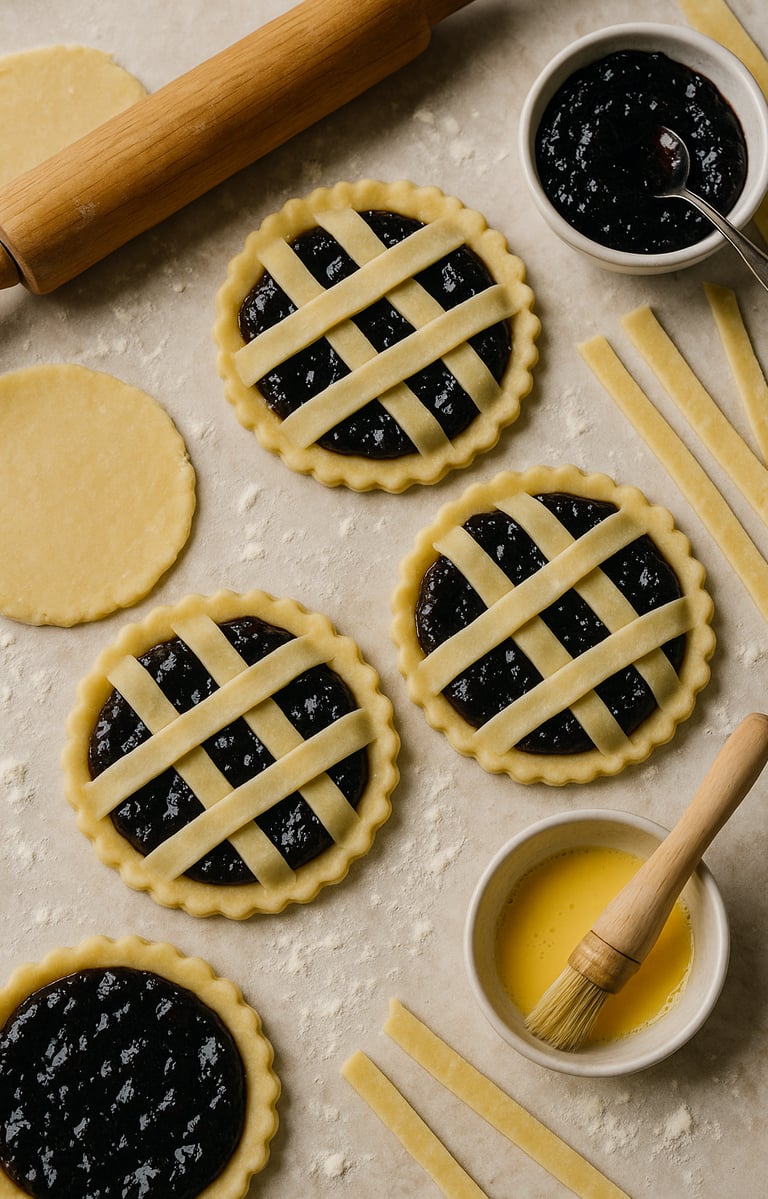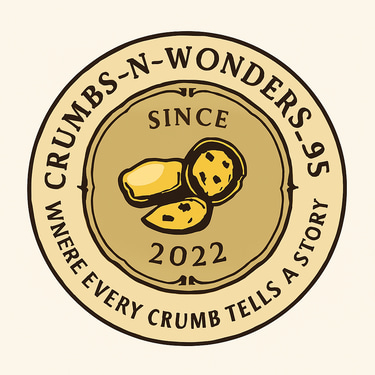The Crostata of Courage
Jean, the home baker, finds in a jam-filled crostata the courage to rejoice in hardship, discovering sweetness even when falsely accused of following God.
BEATITUDES
Wandering Armenian
9/4/20255 min read


The Crostata of Courage
Jean Baptista's fingers could not stop shaking.
He gripped the wooden spoon tighter, trying to steady his hands as he spread the crimson strawberry jam across the pale pastry. But his body betrayed him—every muscle tense with the memory of yesterday's ambush in the church parking lot. The way Sarah's face had twisted with disgust. The cold satisfaction in Tom's eyes as he delivered each cutting word.
"Playing the saint again, Jean? Where exactly where you during the food drive setup while the rest of us were working?"
"Some Christian you are—too busy with your precious baking hobby to help real people."
"We know what you're really about. All that holy talk, but you just want to look good."
The lies. Oh God, the lies. Jean's chest constricted as if someone had wrapped iron bands around his ribs. He had been delivering meals to three shut-in families that morning—something he had done every Saturday for two years. But they did not want to hear that. They wanted a target, and his quiet faith had painted a bullseye on his back.
His grandmother's voice echoed in his memory: "Mijo, when your heart breaks, you bake. The dough does not judge. The oven doesn’t lie."
But even this sacred ritual felt hollow today. Jean pressed his palms against the cool marble countertop, fighting the familiar wave of childhood shame that crashed over him. He was eight years old again, standing alone at recess while the other kids whispered and pointed. He was sixteen again, eating lunch by himself because being "weird" and "too sensitive" made him toxic to touch.
Some things never changed. Some wounds never healed.
With movements that felt mechanical, disconnected from his aching heart, Jean began weaving strips of dough into a lattice pattern. Crostata—his Abuela’s recipe for hope when hope felt impossible. The pastry strips crossed and recrossed, imperfect but intentional, creating something beautiful from simple ingredients.
Just like God does with broken people, he thought bitterly, then immediately felt guilty for the sarcasm.
As the tart slid into the 375-degree oven, Jean slumped into his kitchen chair and opened his worn Bible with trembling fingers. The pages fell open to Matthew 5—the Beatitudes he had memorized as a child but never understood. His eyes burned as he read:
"Blessed are you when people insult you, persecute you and falsely say all kinds of evil against you because of me. Rejoice and be glad, because great is your reward in heaven, for in the same way they persecuted the prophets who were before you." (Matthew 5:11-12)
Rejoice?
Jean's laugh came out as a broken sob. "Rejoice, Jesus? Really?" The words felt blasphemous leaving his lips, but he could not stop them. "You want me to be happy that my own church family thinks I'm a fraud? That people I have served for years now look at me like I am poison?"
The silence in his kitchen felt heavy, suffocating. Jean buried his face in his hands, shoulders shaking with the force of holding back years of accumulated hurt. This was the cost of following Christ authentically—the very people who should understand became your cruellest judges. The very community that preached love became the source of your deepest wounds.
Twenty-five minutes later, the timer's gentle chime cut through his despair.
Jean lifted his head, eyes swollen and raw, and looked through the oven door. His breath caught. The crostata had transformed completely. The jam, which had looked ordinary and dull when he had spooned it from the jar, now bubbled, and glistened like liquid garnets. The heat had concentrated everything—the sweetness deeper, the colors richer, the aroma more complex and inviting than anything that had gone into the oven.
The lattice crust, golden and sturdy, protected the precious filling beneath while allowing glimpses of the treasure within.
The fire made it better.
The thought hit him like lightning, electric and sudden. Jean's hands were still on the oven door handle as understanding flooded through him. The heat had not destroyed the simple ingredients—it had revealed their hidden potential. The strawberries had been sweet before, but now they were transcendent. The pastry had been pale and soft, but now it was strong and golden.
What if—what if this was how God worked too?
Jean pulled the crostata from the oven with shaking hands, tears streaming freely now. He cut a small corner and tasted it, and the flavor exploded across his tongue—tart, sweet, and complex, every note sharpened and purified by its passage through fire.
"Oh," he whispered, understanding flooding his heart like dawn breaking. "Oh, Jesus."
The persecution, the false accusations, the crushing loneliness—what if these were not punishments but purification? What if God was using even the cruellest words to concentrate something precious in his soul, the way fire transformed ordinary fruit into something extraordinary?
Christ had walked this same path. Christ had been misunderstood, falsely accused, abandoned by those who should have loved Him most. And somehow, mysteriously, beautifully, even that betrayal had become part of the redemption story.
Jean thought of his friend Marcus—another casualty of church politics, ostracized for speaking uncomfortable truths about racial justice. Marcus, who sat alone in the back pew now, whose calls went unanswered, whose heart Jean knew was breaking in the same way.
With hands that no longer shook, Jean carefully placed the warm crostata in a white bakery box. He would take it to Marcus today. Not with empty platitudes or theological explanations, but with this tangible reminder: We can rejoice, even in this darkness. Heaven sees everything. God's love remains constant. And somehow, the fire is making us sweeter.
As Jean stepped into the morning sunlight, the warm box cradled against his chest like a precious offering, he felt something fundamental shift inside him. The lies still hurt—they always would. His reputation might never fully recover. The church might never apologize.
But now he carried a secret joy, fragile as eggshell pastry but real as the sun warming his face. God was drafting a story with his suffering, creating beauty from ashes, bringing sweetness from bitterness.
Lord, he whispered, his voice thick with tears that tasted of salt and hope, help me remember that when the fire comes, you are not destroying me. You are revealing the sweetness that was always there, waiting to be discovered. Help me rejoice—not because the pain is not real, but because You're making something beautiful from it. Something that will feed others who are hungry for hope.
The crostata of courage—rustic, imperfect, refined by fire, and sweet beyond measure. Just like the hearts that learn to find joy in the flames.
Scripture Foundation: "Blessed are you when people insult you, persecute you and falsely say all kinds of evil against you because of me. Rejoice and be glad, because great is your reward in heaven, for in the same way they persecuted the prophets who were before you." - Matthew 5:11-12

